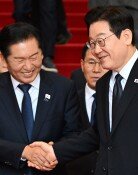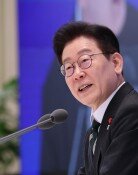Re-election and By-election in 2005 Hinder Ruling Circles Push for Reformation Bill on the Private Educational Law
Re-election and By-election in 2005 Hinder Ruling Circles Push for Reformation Bill on the Private Educational Law
Posted December. 30, 2004 22:28,
Among the four reform bills including issue of the national security law and the three regarding Korean Style New Deal, three or four bills including those on the National Security Law, Private School Law, and the New Deal are highly likely to be dealt with in the National Assembly next year. The followings are projections on the fate of these bills in 2005.
Revision or Abolition of the National Security Law-
Predictions are that the National Security Law will continue to be a major point of contention in the political circles in 2005 if hard-liners in the Uri Party and Democratic Labor Party continue to voice their arguments for the abolition of the law.
Particularly, there is a sense of consensus within the ruling circles that a rapid resolution of the issue would provide a ground for their efforts to resuscitate the economy. Chances are high, therefore, that the Uri Party will convene a special session of the National Assembly starting in early January 2005, and seek the introduction of a bill on abolition of the National Security Law and a complementary bill on the Criminal Law again in the Legislation and Judiciary Committee of the Assembly.
If that happens, the Uri Partys efforts for repeal of the National Security Law are expected to be intense as never before due to the expected synergistic effect of its potential sense of frustration that it lost to the Grand National Party (GNP) and disappointment caused by failing to accomplish its goal of abolishment of the law within 2004. In addition, the civil groups pressure for the repeal of the law is likely to serve as a heavy burden on the ruling circles shoulder.
The crux of the matter is whether the GNP will respond to the Uri Partys convention of the National Assembly. There is much likelihood that the GNP will refuse to come to the session, saying, The issue involving the National Security Law is not urgent and lacks justification for a convention of the special assembly session. In this case, it remains to be seen whether the Uri Party and the Democratic Labor Party will be able to call an incomplete session of the National Assembly without the GNP members.
Furthermore, even if the GNP agrees to attend the special session, serious conflict between the ruling and opposition parties will be unavoidable. That is because theres not much room for the two parties in finding a middle ground because they failed to make an agreement even after discussing introducing an alternative legislation in the middle of the laws revision and abolition.
Reformation Bill on the Private School Law-
The ruling and opposition parties appear to not be able to resolve the issue even in early next year, as it is closely related with the interest of private educational foundations.
For its part, the Uri Party will feel it a burden that it cannot separate the issue from the re-elections and by-elections in April 2005. Organized oppositions from private educational foundations nationwide are expected if the party keeps pushing for its controversial claims such as introducing a system to hire some personnel outside private schools as directors when elections close in. In the meantime, however, the Uri Party should bear criticism from its existent supporters for lacking a will for reform if it steps back.
The GNP predicts that maintenance of the existing law will not greatly affect its outcome in the upcoming re-elections and by-elections.
A Bill on Korean-style New Deal-
The government intends to press for a Korean-style New Deal, centering on national policy projects by tapping into the pension and funds from 2005. The basic law on fund management, National Pension Law, and the Private Investment Law are closely correlated with the financing that will be core of this plan.
Therefore, the government and ruling party will predictably pressure the Grand National Party incessantly to not hinder their policy to revive the economy starting in early next year unless the bill doesnt pass within 2004.
The ruling and opposition parties may find a middle ground with ease since the GNP, at present, is for the passage of the bill as long as its conditions, accurate employment of pension and fund, and their political neutrality are satisfied.
Myoung-Gun Lee gun43@donga.com







